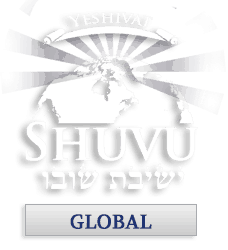וְלָֽקַחְתָּ֞ מִן־הַדָּ֨ם אֲשֶׁ֥ר עַל־הַמִּזְבֵּ֘חַ֘ וּמִשֶּׁ֣מֶן הַמִּשְׁחָה֒ וְהִזֵּיתָ֤ עַל־אַֽהֲרֹן֙ וְעַל־בְּגָדָ֔יו וְעַל־בָּנָ֛יו וְעַל־בִּגְדֵ֥י בָנָ֖יו אִתּ֑וֹ וְקָדַ֥שׁ הוּא֙ וּבְגָדָ֔יו וּבָנָ֛יו וּבִגְדֵ֥י בָנָ֖יו אִתּֽוֹ: וְלָֽקַחְתָּ֣ מִן־הָ֠אַ֠יִל הַחֵ֨לֶב וְהָֽאַלְיָ֜ה וְאֶת־הַחֵ֣לֶב | הַמְכַסֶּ֣ה אֶת־הַקֶּ֗רֶב וְאֵ֨ת יֹתֶ֤רֶת הַכָּבֵד֙ וְאֵ֣ת | שְׁתֵּ֣י הַכְּלָיֹ֗ת וְאֶת־הַחֵ֨לֶב֙ אֲשֶׁ֣ר עֲלֵיהֶ֔ן וְאֵ֖ת שׁ֣וֹק הַיָּמִ֑ין כִּ֛י אֵ֥יל מִלֻּאִ֖ים הֽוּא: וְכִכַּ֨ר לֶ֜חֶם אַחַ֗ת וְחַלַּ֨ת לֶ֥חֶם שֶׁ֛מֶן אַחַ֖ת וְרָקִ֣יק אֶחָ֑ד מִסַּל֙ הַמַּצּ֔וֹת אֲשֶׁ֖ר לִפְנֵ֥י יְהֹוָֽה: וְשַׂמְתָּ֣ הַכֹּ֔ל עַ֚ל כַּפֵּ֣י אַֽהֲרֹ֔ן וְעַ֖ל כַּפֵּ֣י בָנָ֑יו וְהֵֽנַפְתָּ֥ אֹתָ֛ם תְּנוּפָ֖ה לִפְנֵ֥י יְהֹוָֽה:
You shall [then] take [some] of the blood that is upon the altar and [some] of the anointing oil, and sprinkle it upon Aaron and upon his garments, upon his sons and upon the garments of his sons with him; thus he will become holy along with his garments, and his sons and their garments with him. And you shall take out of the ram the fat and the fat tail and the fat that covers the innards, the diaphragm of the liver, the two kidneys along with the fat that is upon them, and the right thigh, for it is a ram of Miluim. And one loaf of bread, one loaf of oil bread, and one wafer from the basket of matzoth that stands before the Lord, and you shall place it all upon Aaron’s palms and upon his sons’ palms, and you shall wave them as a waving before the Lord.
Exodus 29:21-24
This week’s Torah portion contains the instructions for the Miluim. All of Exodus 29 outlines how the Kahuna, the Priesthood, is to be installed and inaugurated in its duties in the Mishkan. Exodus 29:22 describes the offering of a ram for the ceremony as being an offering of Miluim. Miluim is sometimes translated as perfection. The root of the word is Maleh, which indicates fullness or completion. The idea here is that neither the Mishkan, nor the Kahuna are complete until the installation inaugurates the offerings being made in the Mishkan.
Interestingly, this term Miluim is used in modern Hebrew to mean reserve duty in the Tzaha”l. This is because one’s duty is not full or complete until one’s duty in the Miluim, is fulfilled.
In the history of Israel, this installation is one of the most dramatic and pivotal moments. From the time the Miluim is performed until the destruction of Solomon’s temple by Nebuchadnezzar, Israel performed the sacrifices and offerings required by Hashem every day. So, the Miluim real begins a new chapter in Israel’s relationship to Hashem that will continue uninterrupted until the first destruction. The specifics of the ceremony given in Exodus 20 are very simple and deserve much study. Shabbat shalom
